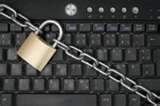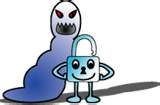Safety or Convenience???
 When it comes to passwords, many users, and I am guilty of this, often take the convenience of using a simple, easy to remember password as opposed to a long difficult one. However, in today’s world of computers, this has become a very dangerous habit. Passwords should be long (minimum 8 characters), and contain alpha, numeric, symbols, in both upper and lower cases. The longer and more random that a password is, the more secure it becomes. But who wants to remember these difficult passwords? Or more importantly, who can remember them? Passwords like 8nhT6xL& rE are almost impossible to remember, especially if you are using different passwords for all your protected accounts, which is also recommended. So how do you create a secure password? Well, you could create a random series of characters and then write them down, and although this is better than a weak password, it still leaves you with the danger of someone seeing these written down passwords or of accidentally losing the physical paper. You could also create a file on your computer or a thumb drive and then encrypt it so that no one, but you, can open it.
When it comes to passwords, many users, and I am guilty of this, often take the convenience of using a simple, easy to remember password as opposed to a long difficult one. However, in today’s world of computers, this has become a very dangerous habit. Passwords should be long (minimum 8 characters), and contain alpha, numeric, symbols, in both upper and lower cases. The longer and more random that a password is, the more secure it becomes. But who wants to remember these difficult passwords? Or more importantly, who can remember them? Passwords like 8nhT6xL& rE are almost impossible to remember, especially if you are using different passwords for all your protected accounts, which is also recommended. So how do you create a secure password? Well, you could create a random series of characters and then write them down, and although this is better than a weak password, it still leaves you with the danger of someone seeing these written down passwords or of accidentally losing the physical paper. You could also create a file on your computer or a thumb drive and then encrypt it so that no one, but you, can open it.
But here is a little trick that, although not the most secure way of keeping a password, it will create more random and difficult to hack passwords. Create a 6 or 8 character password that is completely random, using alpha numeric characters, and symbols, both in lower and upper case. Here is an example. hL3eKi&a. Write this down or put it into a file on your computer so that you can look it up should you forget. Now in addition to this string of characters, add something to it that will make it personal to only you, and something that is easily rememberable. Ok, here is an example…..using the password above, drill into you mind that the passwords that you have written down will have a number starting with 2 and increasing in increments of 2 after every vowel. So the actual password will be as follows hL3e2Ki4&a6. After the first vowel, you add a 2, after the second vowel, you add a 4, and so on. This way, should someone see your written down password, it still won’t work, as you have added the extra little bit in which no one, but you, will know. This is just an example, as you can personalize the password in any way that you want, make it something that you are sure not to forget. This will create a password that is not personally identifiable to you.
characters, add something to it that will make it personal to only you, and something that is easily rememberable. Ok, here is an example…..using the password above, drill into you mind that the passwords that you have written down will have a number starting with 2 and increasing in increments of 2 after every vowel. So the actual password will be as follows hL3e2Ki4&a6. After the first vowel, you add a 2, after the second vowel, you add a 4, and so on. This way, should someone see your written down password, it still won’t work, as you have added the extra little bit in which no one, but you, will know. This is just an example, as you can personalize the password in any way that you want, make it something that you are sure not to forget. This will create a password that is not personally identifiable to you.
Things not to do when creating passwords.
1) Do not use names…many do this and this is easily crackable. 2) Do not use anything that is personal to you, like pet’s names or addresses. 3) Never use passwords like 123456, or qwerty.
With the way that we are using the internet these days for shopping and banking, it is critical that our personal information is not compromised because of a weak password. Phishing attacks are becoming more and more prevalent and we need to take the necessary steps to ensure our safety. Moreover, hackers are becoming more ingenious in gaining control of our systems and networks for use in botnets. For more information on creating strong passwords, click HERE for the Gibson Research Corp.’s site on securing a password.
Do you have a unique way of creating passwords, let us know your method by posting a comment…
September 30, 2009 at 10:30 pm
Hey, great blog…but I don’t understand how to add your site in my rss reader. Can you Help me, please :)
October 1, 2009 at 1:53 pm
Thanks for the comment….
I added RSS to the blog….Look in the right hand pane for the link.
Thanks Again for checking out The Edible Earth!!!!
Chuck
October 6, 2009 at 6:50 pm
Your blog is so informative … ..I just bookmarked you….keep up the good work!!!! :)